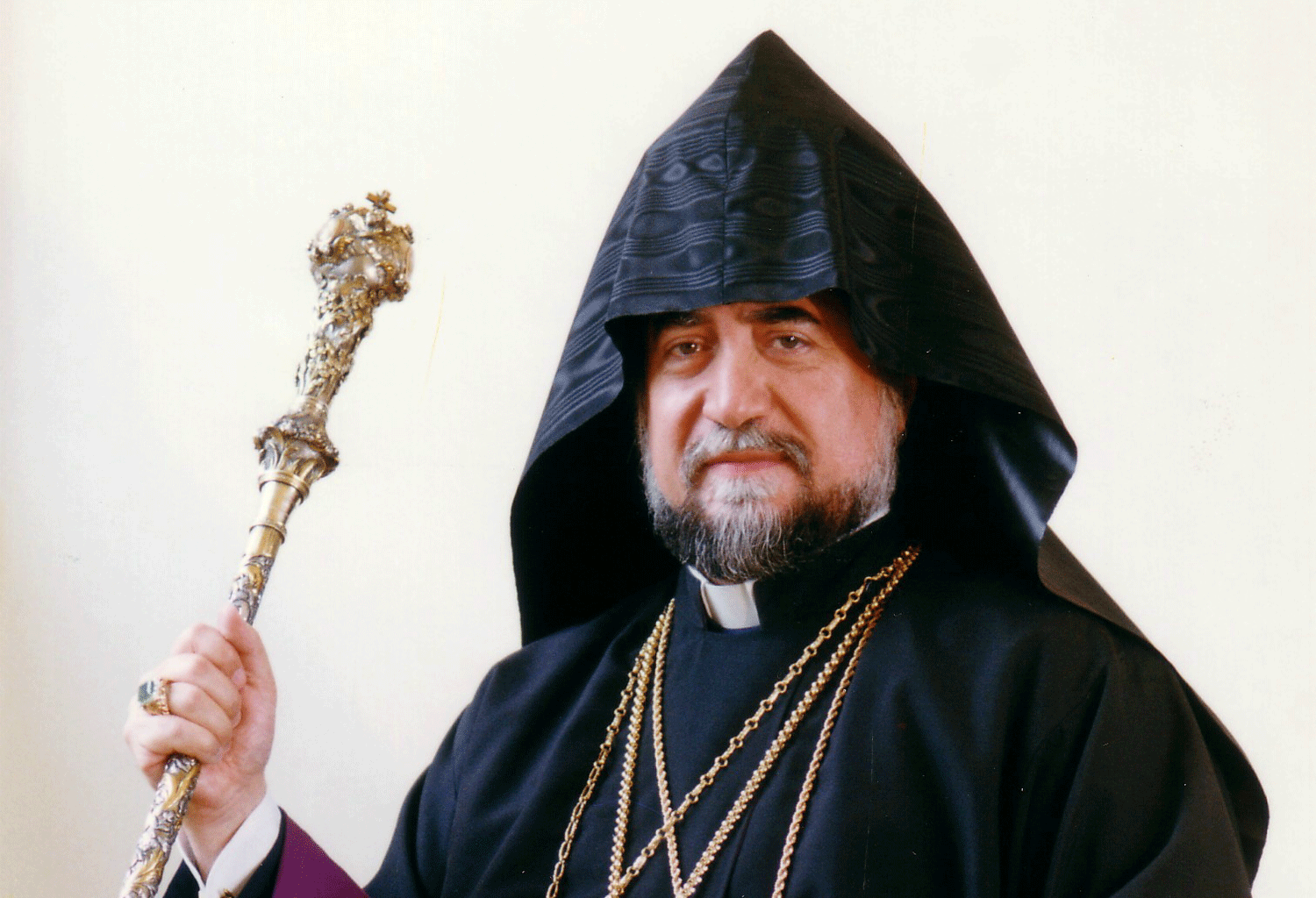THE ARMENIAN PEOPLE
STAND WITH THE PEOPLE OF RWANDA
His Holiness Aram I
As we come together in this stadium let us say together “glory be to God”, because He has brought us together as one people of God. Let us say together, “glory be to God”, because there is hope for Africa. “Glory be to God” because in the power of His spirit Africa is committed to lasting peace.
As Christians we believe that there can be no lasting peace without justice. Furthermore, we believe that working for peace means doing justice; and doing justice in Africa means being with the poor and against all those who make people poor. Doing justice in Africa means being with those affected by the AIDS epidemic; doing justice in Africa means promoting democratic values and ensuring people’s participation in decision making; doing justice in Africa implies doing justice for Africa by strengthening the special place and unique role of Africa in the international community.
Rwanda is, geographically speaking, a small country with a tiny population at the heart of the African continent, but it is a country whose richness resides in its spiritual and moral values, in its commitment to peace with justice, to human dignity and human rights. I am so happy to be with you at this important moment in your history, and to share your memory and experience, your hope and vision. I come here as the Moderator of the World Council of Churches. The WCC is a global fellowship of churches and the churches of Rwanda are members of this organization. Issues related to peace, justice and human rights are at the heart of the vocation of the WCC.
I come here, also, as the Head of the Armenian Catholicosate of Cilicia; a Church whose members were the victims of genocide at the beginning of the 20th century. In fact, the Armenian Genocide was the first genocide of the 20th century, and the genocide in Rwanda the last genocide of the 20th century. Therefore, our two nations have gone through the same experience; and today we stand together and demand justice and accountability from the international community.
As I stand before you, I want to tell you that after so many years of silence, the Armenian genocide was mentioned for the first time in the United Nations, in 1971, and the person who mentioned the Armenian genocide in his report to the Human Rights Commission of the United Nations was one of your distinguished sons from Kigali, Mr. Nicodeine Ruhashyanidko. Therefore, I would like to seize this opportunity to express on behalf of our people our gratitude to you. I would like also to express our full support to you in your commitment to strengthen your internal unity and achieve reconciliation together after your painful experience of genocide some ten years ago. I want on this occasion to emphasize four points:
1. The Christianity is a religion of non-violence.
The Christian religion is, indeed, a religion of non-violence. Our Lord Jesus Christ told us to reject violence. Therefore, as Christians we are called to overcome violence by non-violence; to conquer evil by good. To say “no” to violence in all its forms and expressions is not a passive attitude; it is a courageous act and a responsible decision to go through suffering for those values and truths that are brought to the world as gifts of God by Jesus Christ.
2. The Christianity is a religion of peace.
Peace is a God-given gift. Through His incarnation our Lord Jesus enriched the life of human being with peace. Peace is also a divine mission entrusted to all Christians. Working for peace is an essential dimension of our Christian life and witness; it is integral to being Christian. Therefore peace-building must become a clear priority for Christians in the midst of violence, hatred and conflicts.
3. The Christianity is a religion of justice.
Justice is at the heart of Christian faith and mission. One cannot understand the Gospel of Christ without justice. In fact, our Lord not only prayed for justice but He worked for it; He shed his blood for justice. Being Christian also means struggling for justice; being Christian means rejecting and challenging all those structures which generate and perpetuate in justice.
4. The Christianity is a religion of reconciliation.
Reconciliation means living together, working together and struggling together on the basis of common values and in spite of our differences and particularities. Reconciliation must be based on truth, mutual respect and acceptance. Christianity does not believe in cheap reconciliation. Any real reconciliation must be based on confessing the truth and committing ourselves to justice and peace. This is the true way leading us to reconciliation.
The commemoration of the 10th anniversary of the genocide in Rwanda is an occasion for you remember those victims: your sisters and brothers, your parents, your sons, your pastors, your community leaders and all those who lost their lives during one of the most tragic periods of your history. We must not forget our martyrs. The martyrs are the living source of our spiritual strength, our hope and vision.
This is also an occasion for you to demand justice and accountability. All those who in one way or have another organized or supported this genocide must be accountable. And all those who suffered, reparation must be made for all those who suffered.
This is also an occasion for you to look forward by engaging yourselves in the process of reconciliation and nation-building.
Let us say together “plus jamais la violence”.
Let us together commit ourselves for justice with peace in Rwanda and in all Africa.
Glory be to God. God bless you all.

